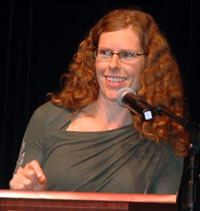TULALIP — Charter schools were the topic of debate at the Greater Marysville Tulalip Chamber of Commerce’s Business Before Hours on Friday, Sept. 28, as Ken Mortland and Shannon Campion hashed out Initiative 1240, a November ballot measure that, if approved by the voters, would allow a limited number of public charter schools in Washington state.
Campion serves as executive director of the Washington chapter of Stand for Children, one of the groups supporting the initiative, while Mortland is a retired teacher from the Northshore School District in Bothell, who taught there from 1970 to 2007.
Mortland opened his remarks by asserting that public charter schools would compete with existing public education, rather than complementing it. He noted that while charter schools are required to have open enrollment, this does not necessarily include transporting students to the school, nor does it factor in the lottery system by which students at a number of charter schools are admitted.
“There is evidence that charter schools sift out disabled or underachieving students,” Mortland said. “The demand on tax revenues increases as charter schools siphon away public education money.”
While Mortland believes that allowing charter schools in the state would contradict the state Legislature’s Supreme Court-mandated priority to ensure adequate education for all the state’s students, Campion countered by characterizing charter schools as allowing “the money to follow the students,” regardless of which educational options they choose.
“The goal is to provide another option, to meet the needs of struggling students,” Campion said. “It recognizes that one size does not fit all.”
Campion touted the greater flexibility of charter schools to set their own schedules and budgets, while still requiring the same certifications of teachers and the same academic requirements of students.
“We can’t make excuses for the growing achievement gap,” said Campion, who explained that Initiative 1240 was drawn from “the best parts” of other states’ laws on charter schools. “It’s important for our low-income and urban children to be able to graduate and go on to college of a trade.”
During the question-and-answer portion of the debate, more than one attendee expressed concerns about charter schools to Campion, with one parent wondering whether non-charter schools would see their funding reduced, while another audience member asked what percentage of charter schools yield the high-performing results that Campion pointed to in the best charter schools from across the country.
Campion responded by comparing charter schools to STEM and other alternative schools as yet another option for students, and reiterated that the November ballot measure represents the lessons learned from the 41 states to have implemented charter schools already.
Mortland followed up by arguing that the state’s 480 innovation schools could serve those students if they were tasked with doing so, before citing statistics showing that 17 percent of charter schools are highly effective, while 37 percent are lower in effectiveness and the remaining 46 percent show no difference at all relative to non-charter public schools.
“There’s no silver bullet,” said Campion, who warned that the state is falling behind on STEM education. “If there’s no demand for them, the charter schools won’t work, but our students deserve that option.”
“The public school system will do as good a job as we make it do,” said Mortland, who claimed that the state’s graduation rate has been flat and near an all-time high for the past two decades. “This is a bird walk of looking at lovely, wonderful, unrealistic things.”
Chamber Board Chair John Bell drew laughter from the crowd when he reported that the meeting’s informal straw poll yielded 23 votes in favor of charter schools and 23 opposed.
The Marysville First Assembly of God Church will host another public debate on Initiative 1240 from 6:30-8:30 p.m. on Thursday, Oct. 11. Contact Barbara O’Kelly by phone at 425-754-9954 or via email at barbara@elcarro.net.



